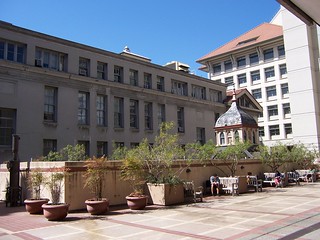Patrick Byrne, Debbie Crans, and Nora Lapitan are among 388 new fellows who will be recognized for their contributions to science and technology at this month’s AAAS meeting in Chicago.

The American Association for the Advancement of Science (AAAS) is an international non-profit organization with the stated goals of promoting cooperation among scientists, defending scientific freedom, encouraging scientific responsibility, and supporting scientific education and science outreach for the betterment of all humanity. It is the world’s largest and most prestigious general scientific society, with 126,995 individual and institutional members at the end of 2008, and is the publisher of the well-known scientific journal Science, which has a weekly circulation of 138,549
Ad
Election as a Fellow of AAAS is an honor bestowed upon members by their peers. Fellows are recognized for meritorious efforts to advance science or its applications. A member whose efforts on behalf of the advancement of science or its applications are scientifically or socially distinguished and who has been a continuous member for the four year period leading up to the year of nomination, may, by virtue of such meritorious contribution be elected a Fellow by the Council.
Dr. Byrne’s areas of expertise are plant breeding and genetics, quantitative trait locus analysis, international agriculture, biotechnology risk assessment. He has published numerous works including “Association analysis reveals effects of wheat glutenin alleles and rye translocations on dough mixing properties,” “Inheritance of long chain fatty acid content in rape seed,” “Jointed goatgrass by imidazolinone-resistant and wheat hybridization under field conditions,” “An empirically derived model of field-scale gene flow in winter wheat.”.
Byrne also received grants for his research from the USDA National Research Initiative, USDA-CSREES Special Research Grant, USDA-CSREES Biotechnology Risk Assessment Grants Program, USDA-CSREES National Needs Fellowship Grants Programs. He teaches SC725, Quantitative Inheritance in Plant Breeding, SC430 Applications of Plant Biotechnology and SC730, Topics in Plant Breeding and Genetics.
Since 2000, Dr. Byrne has conducted a public outreach program on the benefits and risks of genetically engineered crops. He has given talks on this topic throughout Colorado, nationally and internationally, and is part of a group that established an educational website on GE crops.
Dr. Crans is a professor at the Department of Chemistry at CSU. Having a Ph.D in Chemistry from Havard Univesrity. Her interest is in the fundamental chemistry and biochemistry of vanadium and other transition metal ions is fueled by their applications as metals in medicine and their mechanisms of toxicity. The new compounds she and her group synthesized include vanadium alkoxides, vanadium-aminoalcohol complexes, vanadium amino acid complexes, peroxovanadium complexes, hydroxylamidovanadium complexes, picolinate, dipicolinate and other related transition metal coordination complexes. She stated studies of lipid systems and microemulsion environments help her understand how drugs and metabolites interact and penetrate lipid interfaces.
She teaches C341 (C345) Introduction to Organic Chemistry I; C343 (C346) Introduction to Organic Chemistry II; C261 Introduction to Inorganic Chemistry; C113 Introduction of Chemistry; C495 Independent studies; C498 Undergraduate Research; NS295 Introduction to Undergraduate research; NS296 Introduction to Undergraduate research in groups; C566 Bioinorganic and Medicinal Chemistry; C547 Organic Spectroscopy; 547 Physical Organic Chemistry; and C561 Bioorganic Chemistry
Dr. Lapitan’s interest is in understanding of how living organisms function at the level of the gene and genome. She has long been fascinated by the “intelligence” of the DNA – how its structure fits its function, and how the DNA evolves to respond to the needs of the organism. Her research projects have focused on investigating genome organization, gene expression, and identification of genes involved in specific plant phenotypes, with emphasis on converting basic knowledge for practical use in improving plant crops. She teaches SOCR740, Plant Molecular Genetics.









